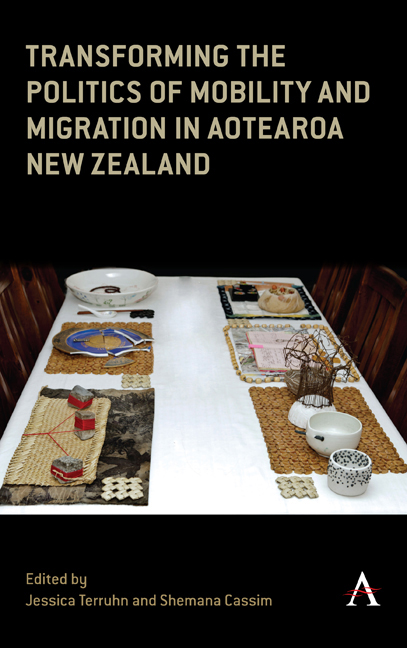Book contents
- Frontmatter
- Contents
- Acknowledgements
- Contributors
- Glossary of Te Reo Māori Words
- Glossary of Te Reo Māori Place Names
- Glossary of Other Non-English Words
- List of Tables
- List of Figures
- Introduction: Reimagining the Politics of Mobility and Migration Through Decolonisation, Social Justice and Solidarities
- Cover Artwork: A Place at the Kauri Table Revisited … 2021
- Part One Decolonising the Politics of Migration
- Part Two Humanising the Politics of Transnational Mobility
- Part Three Building Solidarities for Migrant Rights and Belonging
- Conclusion: Towards Transforming the Politics of Mobility and Migration in Aotearoa New Zealand
- Index
Eleven - If Social Cohesion is the Answer, What Was the Question? Policy Options for a Diverse Aotearoa/New Zealand
Published online by Cambridge University Press: 28 February 2024
- Frontmatter
- Contents
- Acknowledgements
- Contributors
- Glossary of Te Reo Māori Words
- Glossary of Te Reo Māori Place Names
- Glossary of Other Non-English Words
- List of Tables
- List of Figures
- Introduction: Reimagining the Politics of Mobility and Migration Through Decolonisation, Social Justice and Solidarities
- Cover Artwork: A Place at the Kauri Table Revisited … 2021
- Part One Decolonising the Politics of Migration
- Part Two Humanising the Politics of Transnational Mobility
- Part Three Building Solidarities for Migrant Rights and Belonging
- Conclusion: Towards Transforming the Politics of Mobility and Migration in Aotearoa New Zealand
- Index
Summary
Introduction
This chapter starts by providing a brief introduction to the history of social cohesion in Aotearoa/New Zealand. The deployment of the concept locally draws on a complex and long history of the term (see Schiefer and van der Noll 2017, especially for the history of the term; see also Cheong et al. 2007; Fonseca, Lukosch, and Brazier 2019), although the policy and conceptual work that originated in Canada in the late 1990s was especially influential in local approaches and thinking. This can be seen in the work led by the Ministry of Social Development (MSD) in 2005 and 2006. By late 2020, MSD was again the lead agency in a further wave of work on social cohesion, largely as a result of a Royal Commission (2020) recommendation. In the meantime, the initial focus on immigrant settlement and affairs surrounding the ethno-cultural diversification of Aotearoa/New Zealand's population had been replaced by vastly different political imperatives: the challenges to social cohesion had been redefined by voices on the political left and right, that is, political movements that either sought justice or challenged the political and social acceptance of diversity in some way. The proliferation of online hate has emphasised these contemporary challenges, especially as the volume of such material (domestically and internationally) has increased significantly since 2015–2016.
If social cohesion is to have any relevance or political acceptability, then it needs to address questions of equity and social justice. We position social cohesion as providing an important political and policy option to ensure an active, engaged and inclusive citizenship which, in turn, requires the reshaping of possibilities and governance (cf. Harris and Johns 2021). Given the context and imperatives of a contemporary Aotearoa/New Zealand, Te Tiriti o Waitangi (The Treaty of Waitangi) and the values and principles that underpin it must become critical to a rejuvenated approach towards, and understanding of, social cohesion. Such a re-envisioning of social cohesion represents a political opportunity to reduce or abandon the integrationist and assimilatory approaches of the past and to instead address the long-standing effects of institutional racism and social, educational and economic marginalisation.
A Brief History of Social Cohesion in Aotearoa/New Zealand
Initial approaches: Addressing immigration and diversity
Aotearoa/New Zealand's interest in social cohesion as government policy emerged from a period of changing demographics in the 1990s.
- Type
- Chapter
- Information
- Publisher: Anthem PressPrint publication year: 2023

